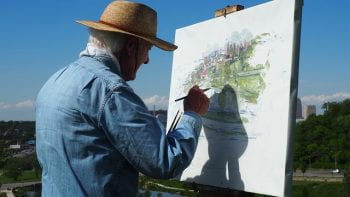Written by Brian Carpenter, professor of psychological and brain science; co-director of the Harvey A. Friedman Center for Aging

What’s the forecast today? Can you expect sun and warm breezes? Maybe a chance of showers? Should you grab a coat? This time of year the weather can be unpredictable, but we pay attention to the weather all year. What’s been different over the last several years is that we’re also talking about climate. (Both describe what’s going on in the atmosphere: weather is what’s happening outside today, and climate is weather over a longer period of time, usually more than 30 years.)
You’ve probably heard a lot about climate change in the news. Storms are becoming more intense and frequent. Flooding and wildfires more destructive. March of 2024 brought the 10th straight month of the hottest months on record. And surveys show that people are worried about these changes. Along with rising temperatures, climate anxiety is at an all-time high.
Climate change affects everyone. It’s a global issue that has an impact on people regardless of gender identity, race and ethnicity, geographic location and nationality, or political affiliation. The effects of climate change also cut across all age groups. Some people argue that it’s the policies and practices of the current older generation that created the climate crisis in the first place – a reliance on fossil fuels that led to global warming. And it’s young people who are going to have to live with the consequences.
But that kind of thinking overlooks one fact: that its older adults who are more vulnerable to the effects of climate change right now than people in other age groups. What does that look like? Well, for example, older adults have bodies that may be less able to handle the extreme temperatures that are becoming more common. The St. Louis region experienced one of its hottest summer in 2023, with several heat waves (defined by the National Weather Service as excessive temperatures lasting more than two days). And in the 2021 heat wave that hit the American Northwest, the average age of the people who died in the Portland region was 70 years old, and people over age 65 accounted 75% of the deaths in Washington State.
Older adults also may be in living situations that are more risky when the weather turns bad. You’ve seen photos of older adults being rushed out of their nursing home during a flood, losing their home and community and healthcare all at once. Even older adults living in their own home might not have the financial resources to buy an air conditioner in the summer or pay for their heat in the winter. For these reasons and more, older adults are among the groups considered most vulnerable to the effects of climate change.
But these stories overlook another angle. As Dr. Karl Pillemer of Cornell University has pointed out in their Aging & Climate Change Clearinghouse, older adults are also an important part of the solution to addressing climate change. First, they have the skills and experience to engage with this kind of social issue, based on life experiences and, for some, prior activism with other causes such as racial and gender equality and nuclear nonproliferation. Second, some older adults have the time to devote to volunteering with organizations working toward climate change solutions or advocating for climate-friendly policies. Third, regardless of their personal resources or abilities, they may be able to support younger people in climate advocacy. Third Act is an example of one group that highlights those important roles older adults can take and helps local communities get organized so older adults can join in.
The climate change crisis needs our immediate (and sustained) attention. Part of that response needs to acknowledge that some older adults may be uniquely at risk to extreme weather events and broad changes in climate patterns, with fewer options to relocate, renovate, or adapt to the new reality. So, we need programs to support older adults; to provide air conditioners, heaters, home weatherization, and financial support to pay higher utility bills. And we need federal and state disaster preparedness plans that highlight the needs of more frail older adults.
But we also need to welcome more older adults into opportunities to contribute to climate solutions. Older adults have tremendous creativity, wisdom, insight, and energy, and if we overlook their talents, we miss the chance to give them purposeful engagement in a meaningful cause, and we miss an opportunity to bring more attention to the changing weather around all of us.